- Simple mastectomy: the breast tissue and skin are both removed
- Subcutaneous mastectomy: the breast tissue is removed but the skin is untouched
- Radical mastectomy: the breast tissue, skin, muscles behind the breast and lymph glands in the armpit are all removed
- Modified radical mastectomy: the same as radical mastectomy but the pectoral muscles are left in place
 Above: Chest toning and stretching exercises as part of rehabilitation following surgery
Above: Chest toning and stretching exercises as part of rehabilitation following surgeryWhy might I need a mastectomy?
A mastectomy is usually recommended for individuals with breast cancer but there are also a variety of specific reasons for having the operation:
- To reduce the risk of breast cancer in a healthy breast
- The cancerous tissue has spread to other areas
- A tumour just behind the nipple
What does a mastectomy involve?
The operation is done under general anaesthetic which means you will be asleep throughout the surgery and will not feel anything. The operation can take up to two hours and an incision (cut) will be made on the breast where the breast tissue will be removed from. Skin may also be removed depending on the type of mastectomy you are having.
If you are having an artificial breast, a breast reconstruction will be carried out where silicone or tissue from another area such as your abdominals or back will be used to create a new breast.
What are the symptoms following a mastectomy?
Symptoms vary greatly and depends on the type of mastectomy carried out. Your physiotherapist at Physio.co.uk will help you manage your symptoms so you experience as little discomfort as possible. Symptoms may include:
- Pain
- Tenderness around the breast area
- Temporary numbness or pins and needles where nerves have been cut during the operation
- Swelling
- A scar from where the incision was made
- Weakness if muscles were cut through or removed
- Reduced range of movement
- Increase in your emotions
- Stiffness in the shoulder area
What does physiotherapy for a mastectomy involve?
Although mastectomies are very successful, the surgical procedure is invasive and therefore physiotherapy is an effective way of reducing post operative pain and stiffness and helping you return to your normal activities of daily living as soon as possible. The specialist physiotherapists at Physio.co.uk will carry out a full assessment and work with you to set goals for your recovery to design an individualised physiotherapy programme.
Week 1
You will be required to stay in hospital for a few days after your operation as an in-patient to make sure that there are no complications and you are recovering well. Once you have been discharged, it is important that you begin your physiotherapy programme with Physio.co.uk as soon as possible. Physiotherapy may include:
- Pain control modalities
- Simple circulation exercises
- Cyrotherapy (ice) for swelling
- Breathing exercises
- Range of movement exercise in areas that may feel tight
- Advise on comfortable positioning
Weeks 2-4
The temporary symptoms that you may have experienced during the first week after your operation should now be reducing and you will feel able to do more around the house. Your physiotherapist at Physio.co.uk will now focus on gradually improving your independence. Physiotherapy may include:
- Teaching of scar mobility techniques
- Arm exercises to improve strength and movement
- Provision of adaptations to help you around the home if needed
- Increasing mobility
Weeks 5 onwards
You should now feel a lot more independent and wanting to return to your normal lifestyle. Physio.co.uk will encourage more activity but also highlight the importance of pacing yourself to optimise your recovery. Physiotherapy could include:
- Gradual return to normal activities of daily living
- Hydrotherapy
- Progression of arm and shoulder exercises
- Cardiovascular activity
- Reducing dependence on adaptations and equipment
Summary
A mastectomy is an operation to remove the breast usually because the tissue has been affected by cancer. The surgery has very high success rates and it is important that you have physiotherapy to optimise your recovery. The specialist physiotherapists at Physio.co.uk will work with you to design a personalised programme to reduce your symptoms following the surgery and reduce the risk of any other complications. Please call Physio.co.uk today on 0330 088 7800 to book an appointment. You can also book an appointment online today.

 0330 088 7800
0330 088 7800

































